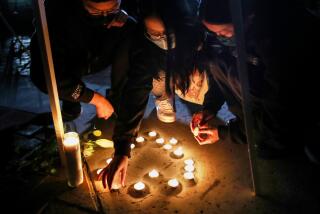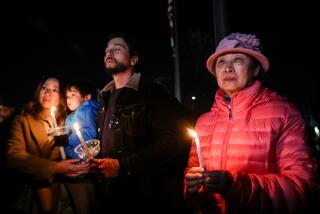Filipinos Kill 2 Americans as Quayle Arrives
- Share via
MANILA — Vice President Dan Quayle, who arrived amid anti-American demonstrations here Tuesday night shortly after suspected Communist rebels killed two American employees at a U.S. military base, today condemned the killings as “cowardly murders” that were linked to his visit.
Although no group immediately claimed responsibility, U.S. and Philippine officials said the bloody ambush appeared to be the work of the Communist New People’s Army, which has assassinated four other Americans in the last two years.
U.S. officials confirmed that they had received threats from the NPA that Americans would be attacked if Quayle arrived here.
‘People Are Sickened’
“It should go without saying that these cowardly murders deserve the strong condemnation of all civilized men and women,” Quayle told a breakfast meeting with business groups. “The people of the Philippines, like the people of the United States, are sickened by the acts of vicious terrorists who wish to drown freedom in the blood of innocent men and women.
“The killings unfortunately were timed to my visit,” he told reporters.
The two slain Americans were identified as William H. Thompson, 45, and Donald G. Buchner, 44. Officials said both men had retired from the Air Force in 1987 and were technicians for Ford Aerospace and Communications Corp., a Pentagon contractor at Camp O’Donnell, about 60 miles north of Manila.
Susan M. Pearce, a vice president at the headquarters of Ford Aerospace Corp. in Newport Beach, Calif., said the company has “maintained good relations with the local Philippine community” and “there is no apparent motive for this attack.”
The two victims, both married with children, were among 85 Ford Aerospace workers at Camp O’Donnell, Pearce said. She added that there has never been “a prior incident of this kind involving our personnel.”
Communications Facility
Officials said Camp O’Donnell is a sophisticated military communications facility with a U.S. Navy radio transmitter, an embassy radio relay station, and an Air Force electronic warfare system for Clark’s sprawling Crowe Valley bombing range. O’Donnell has about 135 military and civilian employees.
Quayle also met briefly with the widow of an officer of President Corazon Aquino’s palace guard, who was killed in a separate ambush earlier Tuesday about a mile from the presidential palace. Quayle blamed the New People’s Army for his death as well.
About 200 demonstrators chanted “Yankee Go Home” and burned a large American flag as Quayle’s motorcade sped past the entrance to Ninoy Aquino International Airport when Quayle arrived Tuesday evening. The protesters demanded an end to U.S. military bases in the Philippines.
Security officials blocked streets and kept demonstrators far from the vice president this morning as Quayle began the formal portion of his 40-hour visit to the Philippines with a wreath-laying ceremony and a 40-minute meeting with President Corazon Aquino at Malacanang Palace.
Quayle presented Aquino with a letter from President Bush formally asking to open negotiations over the future of Clark Air Base and Subic Bay Naval Base, America’s largest overseas military garrisons, and four smaller facilities. The one-page letter asked that talks begin by December but offered no specific terms, U.S. officials said.
The bases issue is increasingly divisive here. The Pentagon considers the installations vital to protecting Pacific sea lanes and preserving stability in the region. But many Philippine leaders regard them as a vestige of the nation’s colonial ties to the U.S. and an affront to national sovereignty.
The current contract for the bases expires in September, 1991. Any new agreement must be ratified by the 23-member Philippine Senate, where opposition to the bases is strong. Other officials have called for phasing the bases out in five to ten years.
In Washington, meanwhile, a State Department spokesman denounced the killings of the two Americans as “senseless and cowardly.”
Air Force Maj. Wayne Crist, a spokesman at Clark Air Base, said early today that military personnel and Department of Defense employees in the Philippines “are being advised to avoid non-essential travel between facilities until further notice.” The U.S. military television network later announced that Camp O’Donnell personnel should not report for work today.
Nearly 40,000 U.S. troops, military dependents and civilian employees are stationed at the bases. They also employ 68,000 Filipinos.
Police said the two Americans were ambushed Tuesday afternoon about 12 miles north of Clark on a paved rural highway that connects Camp O’Donnell with the town of Capas in Tarlac province.
Capas Police Chief Pepito Pimentel said Thompson was driving a Toyota Corolla south, with Buckner beside him, when a dump truck suddenly blocked the road. Pimentel said six men armed with M-16 and M-14 assault rifles leaped out and opened fire on the Americans, riddling them and the car with bullets. The two men were found slumped in their seats, with both doors open. “The bodies were heavily mangled,” Pimentel said. “We found 69 spent cartridges at the ambush site.”
Capas Mayor Hermes Frias said nothing was taken from the bodies, and the car was not ransacked. “This was a well planned ambush,” he said. “They knew what time the car was passing by.”
The assailants fled in a jeepney. An M-16 magazine and live 9-millimeter bullets were found in the dump truck.
“I think there’s no doubt it’s the NPA,” one Western military official said early today. He speculated that the killers were part of the Central Luzon Regional Front, an New People’s Army guerrilla group that killed two U.S. Air Force enlisted men and an American civilian outside Clark on Oct. 28, 1987.
Five months ago, on April 21, U.S. Army Col. James Rowe, a counterinsurgency expert, was ambushed and killed in the Manila suburb of Quezon City as he was being driven to his office at the U.S. Joint Military Assistance Group.
The New People’s Army later said it killed Rowe, 51, a heavily decorated Vietnam veteran and former prisoner of war, for his “direct” involvement in the Philippine government’s “total war” policy against the rebels.
Two weeks earlier, guerrillas blew up a communications facility operated by the U.S. Air Force and Navy and the Philippine military near Baguio in northern Luzon. No one was injured.
Tuesday’s ambush came after a week of arrests and demonstrations outside the U.S. Embassy, a series of shootings and grenade attacks in Manila, and a barrage of anti-American press reports over alleged “meddling” in Philippine affairs.
Early Tuesday, unidentified gunmen shot and killed Capt. Carlos Daileg, a staff officer of President Aquino’s security command as he drove his car about a mile from the presidential palace. He was the fourth member of the presidential guard killed in the past four months.
Later Tuesday, 10 students were arrested after demonstrators protesting Quayle’s visit and rising tuition fees tossed a small homemade bomb at riot police on a street across the Pasig River from the presidential palace. Six police were injured.
More to Read
Get the L.A. Times Politics newsletter
Deeply reported insights into legislation, politics and policy from Sacramento, Washington and beyond. In your inbox twice per week.
You may occasionally receive promotional content from the Los Angeles Times.












